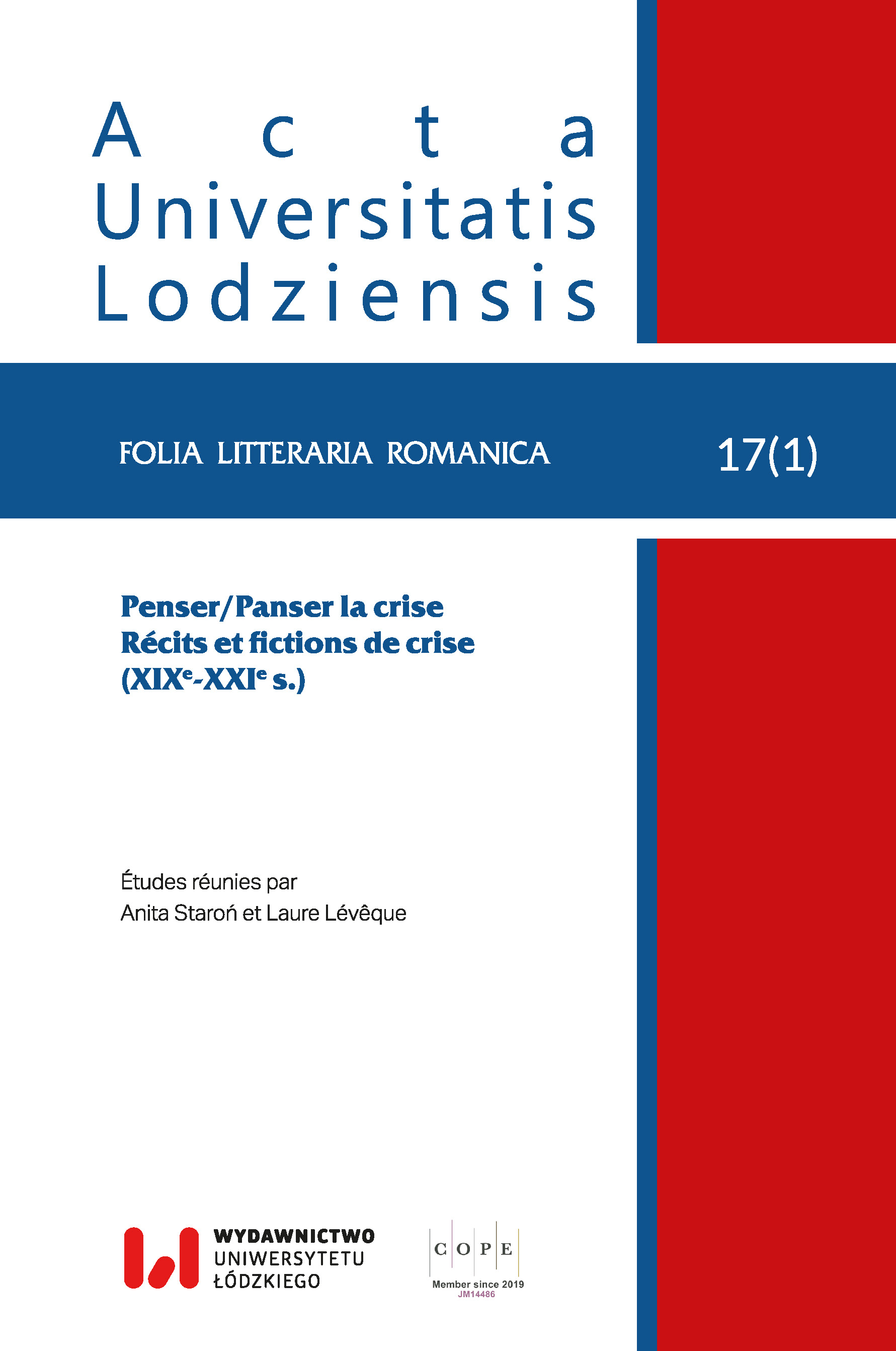Fiction (post-)apocalyptique et usages critiques de l’histoire : "Malevil" (1972) de Robert Merle
DOI :
https://doi.org/10.18778/1505-9065.17.1.19Mots-clés :
Merle (Robert), anticipation, post-apocalyptique (fiction), dystopie, caverne (allégorie de la), histoire (sens de l’)Résumé
Marqué par les dérives d’un XXe siècle tombé dans les pires excès et dans l’horreur nue, Robert Merle, romancier humaniste et engagé, en vient à questionner l’humanité de l’homme. Chez cet écrivain populaire, cela passe par l’inscription dans les genres en vogue de l’anticipation ou de la dystopie où les dauphins Fa et Bi sont plus avisés que les humains (Un animal doué de raison, 1967), espèce qui ne mérite pas forcément de se perpétuer (Les hommes protégés, 1974). En 1972, avec Malevil, Merle sacrifie à la littérature post-apocalyptique et imagine qu’une catastrophe nucléaire a ramené l’homme à une condition primaire, situation qui lui sert à penser la crise politique et morale au cœur de la cité. Mais, au-delà de cette classique fonction révélatrice, l’heuristique de la crise confronte Merle aux points aveugles de son référentiel idéologique et le texte met finalement en crise jusqu’aux positions progressistes affichées par l’auteur, rabattant le roman sur les positions réactionnaires qu’un Barjavel développe dans Ravage (1943).
Téléchargements
Références
Cabet, Étienne, Le Vrai christianisme suivant Jésus-Christ, Paris, Au Bureau du Populaire, 1846
Google Scholar
Chapoutot, Johann, Le National-socialisme et l’Antiquité, Paris, Presses Universitaires de France, 2008
Google Scholar
Dictionnaire historique de la langue française, Paris, Dictionnaires Le Robert, 1992, vol. II, s. v. « Religion », p. 1758
Google Scholar
Ernoult, Nathalie, « Une utopie platonicienne : la communauté des femmes et des enfants », Clio, 22 : Histoire, femmes et société, 2005, p. 211-217, https://doi.org/10.4000/clio.1778
Google Scholar
DOI: https://doi.org/10.4000/clio.1778
Fried, Morton Herbert, The Notion of Tribe, Menlo Park (CA), Cummings Publishing Co, 1975
Google Scholar
Godelier, Maurice, Les Tribus dans l’histoire et face aux États, Paris, CNRS Éditions, 2010, https://doi.org/10.3917/cnrs.gode.2010.01
Google Scholar
DOI: https://doi.org/10.3917/cnrs.gode.2010.01
Hobbes, Thomas, Léviathan, Paris, GF, 2017 [1651]
Google Scholar
Jameson, Fredric, Archéologies du futur. Le désir nommé utopie, Paris, Max Milo, « L’inconnu », 2007 [2005]
Google Scholar
Lavallée, Marie-Josée, « De l’Antiquité au totalitarisme : le Platon politique d’Hannah Arendt », Les Études classiques, 2016, 84
Google Scholar
Lavallée, Marie-Josée, Lire Platon avec Hannah Arendt. Pensée, politique, totalitarisme, Montréal, Presses de l’Université de Montréal, 2018, https://doi.org/10.2307/j.ctv69t4g6
Google Scholar
DOI: https://doi.org/10.2307/j.ctv69t4g6
Le Goff, Jacques, « Les trois fonctions indo-européennes. L’historien et l’Europe féodale », Annales. Économies, Sociétés, Civilisations, 1979, 34e année, N° 6, p. 1187-1215, https://doi.org/10.3406/ahess.1979.294118
Google Scholar
DOI: https://doi.org/10.3406/ahess.1979.294118
Merle, Robert, « Je suis un écrivain engagé », Droit et liberté, juillet-août 1962, n° 211
Google Scholar
Merle, Robert, « Politique-fiction et angoisse planétaire », Le Monde, supplément au no 7074, 11 octobre 1967, p. IV-V
Google Scholar
Merle, Robert, Malevil, Paris, Gallimard, « Folio », 2019 [1972]
Google Scholar
Platon, La République, VII-VIII, Paris, GF, 2016
Google Scholar
Popper, Karl, La Société ouverte et ses ennemis, Tome 1 : L’Ascendant de Platon, Londres, Routledge, 1945
Google Scholar
Roca, Paul (abbé), La Crise fatale et le salut de l’Europe. Étude critique sur les missions de M. de Saint-Yves, Paris, Garnier Frères, 1885
Google Scholar
Roca, Paul (abbé), La Fin de l’ancien monde, les nouveaux cieux et la nouvelle terre, Paris, Jules Lévy, 1886
Google Scholar
Saïd, Suzanne, « La République de Platon et la communauté des femmes », L’Antiquité classique, 1986, tome 55, p. 142-162, https://doi.org/10.3406/antiq.1986.2174
Google Scholar
DOI: https://doi.org/10.3406/antiq.1986.2174
Wattel, Anne, Robert Merle. Écrivain singulier du propre de l’homme, Villeneuve d’Ascq, P. U. du Septentrion, 2018, https://doi.org/10.4000/books.septentrion.18575
Google Scholar
DOI: https://doi.org/10.4000/books.septentrion.18575
Publiée
Comment citer
Numéro
Rubrique
Licence

Ce travail est disponible sous licence Creative Commons Attribution - Pas d'Utilisation Commerciale - Pas de Modification 4.0 International.











